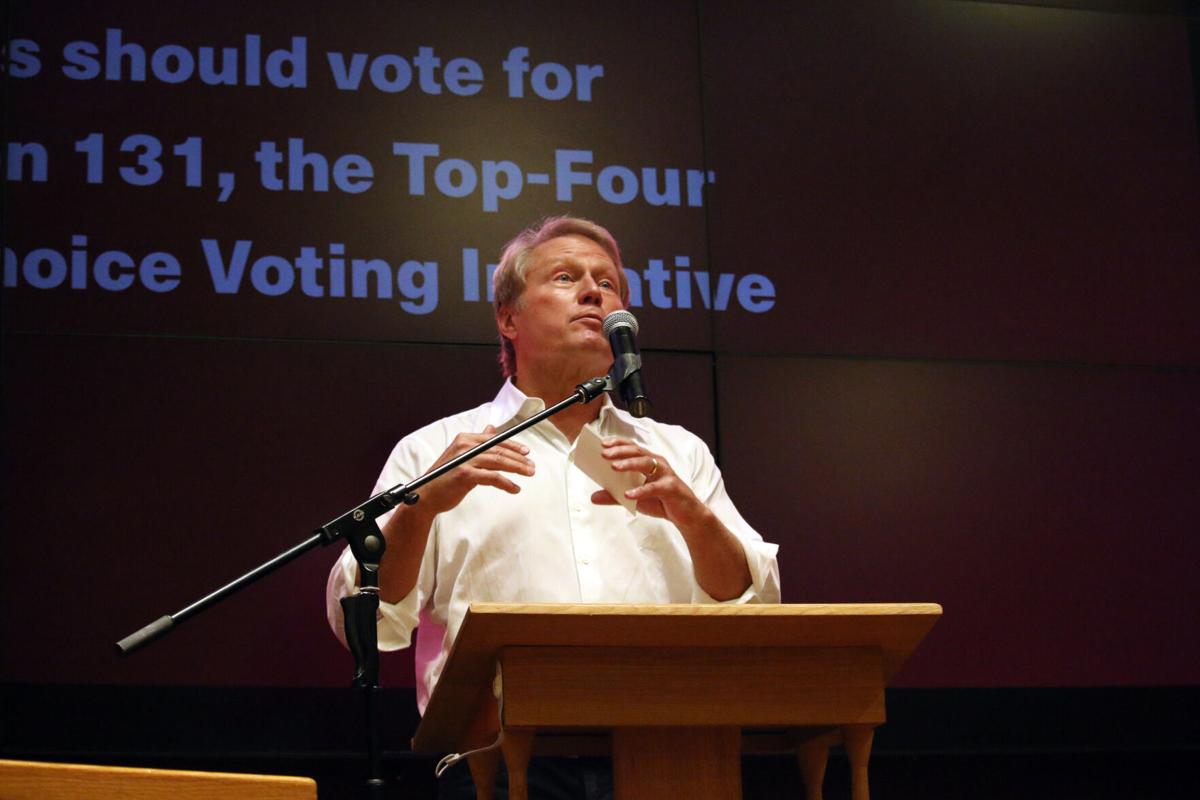Looking for the son (or daughter) of 131 | SONDERMANN
Kent Thiry, meet Douglas Bruce.
The two would seem to have little in common. Thiry is as conspicuously cheery as Bruce is dour. Thiry is a social animal while Bruce is something of the oddball loner. Thiry has friends galore in high places while Bruce could have Thanksgiving dinner in a phone booth. Thiry mastered the corporate world while Bruce ground out a living as a slumlord. Even as each became all too familiar with the inside of a courtroom.
For those newer to Colorado or paying lesser attention, Thiry, the retired CEO of the dialysis giant, DaVita, was the driving force and leading funder behind last fall’s Proposition 131 which sought to overhaul the state’s election process by instituting an all-comers primary and then conducting the November general election by ranked-choice voting.
While voters turned thumbs-down to that proposal, over recent years Thiry succeeded with ballot measures revamping Colorado’s redistricting process and opening primary elections to the nearly half of Coloradans registered as unaffiliated.
Dialing the clock back far further, Bruce was the author and champion of Colorado’s Taxpayer Bill of Rights. Known by the shorthand of TABOR, over the past 32 years it has become as much a fixture of the Colorado landscape as the Flatirons or Pikes Peak.
Though quite different characters, Thiry and Bruce share two vital traits. One is a maverick quality and inclination to go against the grain. The other is an unyielding tenacity.
Before Bruce got TABOR across the finish line in 1992, he had tried and failed with earlier versions in the two preceding elections. A similar measure with different paternity had been on the 1986 ballot. (Full disclosure: I directed the campaigns against the 1986, 1988 and 1990 proposals.)
Thiry’s previous ballot ventures on redistricting and primary election voting access were veritable cakewalks. His latest pursuit is a far tougher undertaking that will require Job’s patience to go along with Bruce’s persistence.
Proposition 131 fell victim to its own complexity. Change is scary; and change layered with elaborate complication is doubly so.
As Bruce learned from each voter rejection and trimmed his sails on some provisions, Thiry and his compatriots will need to go through a similar process of reassessment and recalibration.
All that said, there can be no doubt that Colorado’s election structure is crying out for change. Consider this most recent election.
Of the contests in Colorado’s eight congressional districts, only two (25%) were competitive as defined by a winning margin under 12 percent. Another two of those eight races featured only a single viable candidate as indicated by a winning margin north of 25 percent.
For the State Senate, 14 of 18 races were uncompetitive. Two featured a sole candidate and seven more had only one viable candidate.
State House contests produced similar numbers. 49 or 65 races (again, three-quarters) were uncompetitive by any meaningful standard. Such is the case from top to bottom of the ballot.
Non-competitive elections are a direct cause of tribal polarization that is the dominant feature of this political era.
In such all-too-prevalent circumstances where the November election is a foregone conclusion, the primary election becomes everything. Democratic primaries thus produce a dash to the left while Republican primaries are a sprint to the right.
When the built-in incentives promote polarization, is it any surprise that ever more permanent, entrenched division is the result?
Redistricting reform and elevating competitiveness as an objective go only so far. Coloradans are hardly alone in sorting themselves into blue neighborhoods and red ones as more and more among us feel compelled to live among the like-minded.
Populations patterns and partisan groupings being what they are, this problem of competitiveness will not be fixed or even largely ameliorated by better map-making. Until we dent the compulsion to sort ourselves into red and blue camps, the answer lies in restructuring elections to make November elections more important and June primaries less so.
An overwhelmingly Democratic district deserves Democratic representation. But why not give voters – all voters – a choice of two Democrats, one perhaps more progressive and the other more moderate, come November? Ditto, of course, for Republican-dominated districts.
It is back to the drawing boards for Kent Thiry and his team. Proposition 131 may have been too much all at once. Perhaps ranked-choice voting is not yet ripe. A half-loaf is not to be scorned. For now, a California-style all-comers primary with the top two finishers, regardless of party, advancing to the November ballot could be a substantial remedy.
One electoral loss is a setback, not a final defeat. Doug Bruce is watching and taking measure of Thiry’s perseverance.
Eric Sondermann is a Colorado-based independent political commentator. He writes regularly for ColoradoPolitics and the Gazette newspapers. Reach him at EWS@EricSondermann.com; follow him at @EricSondermann










